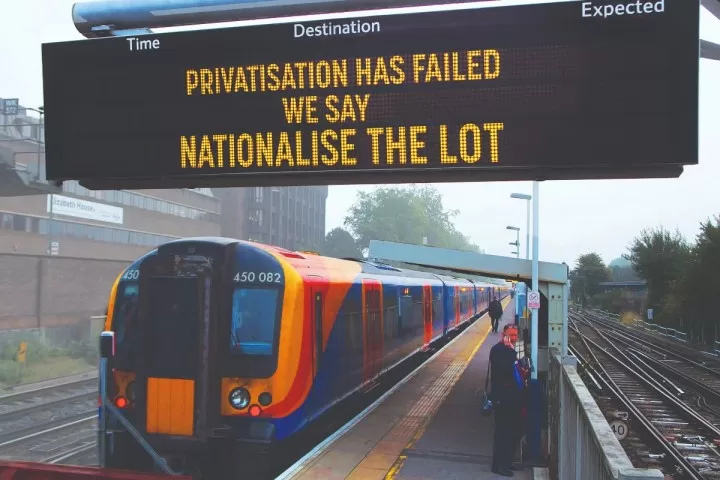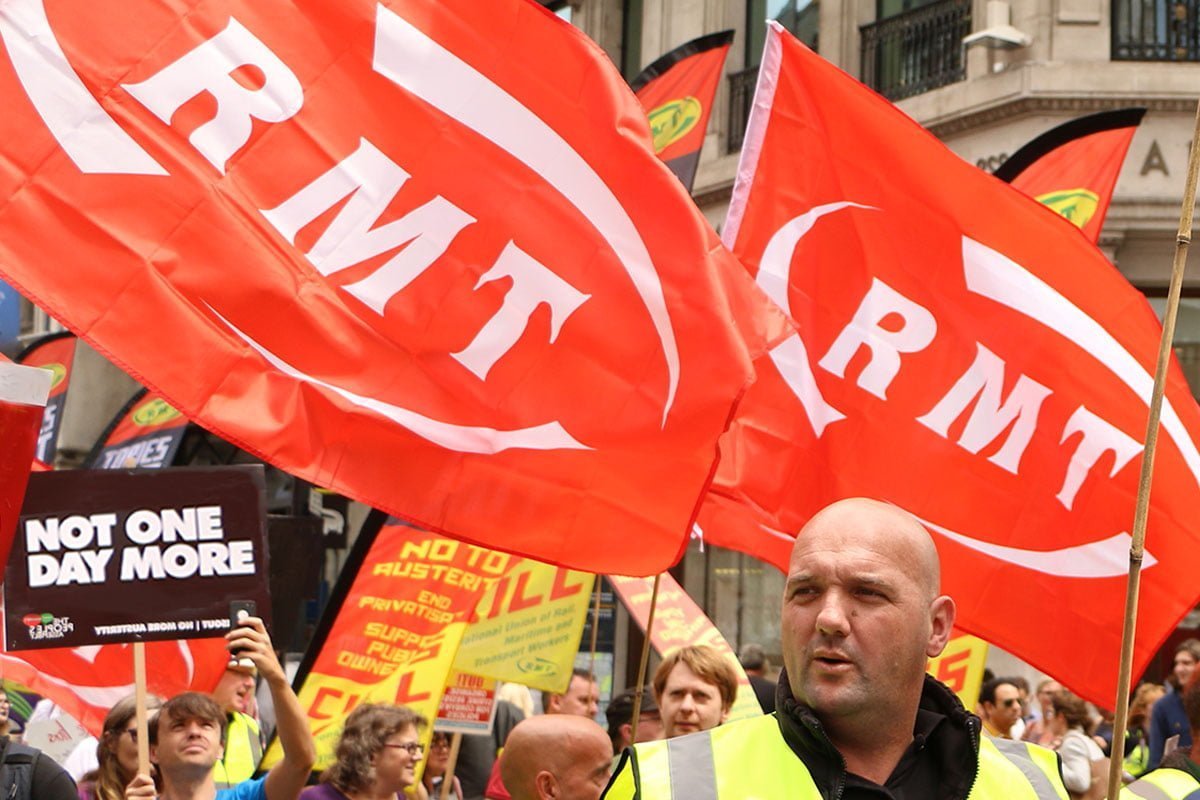Railway bosses are going on the offensive against workers, with an onslaught of attacks planned across the network. Rail unions must link up and wage a militant fightback against these cuts, demanding nationalisation and workers’ control.
Following announcements of fresh cuts across the rail industry last week, rail unions are preparing for war. A national, militant struggle linked up across unions is needed to fight these cuts.
The cuts, forecast to amount to £2bn, are to come via the depletion of services – in particular within ScotRail and SouthWestern Region – and an industry-wide voluntary severance scheme for staff.
Network Rail, which owns and maintains the railway infrastructure across the country, is also set to halve the frequency of maintenance work. This would involve the lay-off of a third of the workforce (around 4,000-5,000 workers), according to the RMT. This would be in conjunction with a pay freeze and general attack on conditions.
In effect, in the words of RMT general secretary Mick Lynch, these cuts would be a “return to the dark days of Railtrack”.
This was the private company that preceded Network Rail, “where cutting costs and corners led to a string of fatal accidents”, such as the Southall rail crash in 1997, the Ladbroke Grove rail crash in 1999, and the Hatfield rail crash in 2000.
Steamrolling cuts

In reality, despite some delays and promises of negotiation with the unions, Network Rail has already rolled out phase one of its severance scheme and has started on the second.
This demonstrates the real intentions of the bosses. Publicly, they will cheerfully talk about involving the unions at all levels of discussion. In reality, they will try and steamroller these cuts through whatever the cost.
Mick Lynch has responded strongly, saying: “[The RMT] are angry that these proposals have been bounced on us outside of the discussions we have been engaged in…That is a serious breach of trust.”
Lynch is right to say that the severance scheme is a breach of trust; it is indeed a scandalous offensive against workers by the bosses.
The Rail Delivery Group, the body overseeing the cuts, describes them as a “vital set of reforms to create a more modern, reliable and passenger-focused railway as it builds back from the pandemic and responds to changing travel patterns.” This is nonsense.
Britain’s railways are in a dire state due to chronic underinvestment and poor long-term planning. Combined with privatisation, this has only meant rising prices and worse service for customers. Now they want to roll back more safety and service and call that ‘modernisation’.
We must add, however, that there can be no return to ‘normal industrial relations’, as Lynch has called for recently. These cuts across the railway industry are part of a wider context of attacks on the working class – as we have seen with fire and rehire, pay freezes, and lay-offs across industries.
Balancing the books
The planned cuts for Network Rail is just the start. The Tories have spent £340bn throughout the pandemic to keep capitalism afloat. And now they are desperately looking to ‘rebalance’ the budget sheet.
Meanwhile, the parasites of the country’s railway system – the train, freight, and rolling stock companies (TOCs, FOCs and ROSCOs) – are seeking to boost their profits, which is their only motive.
It does not matter that passenger numbers are slowly rising back towards pre-pandemic levels: these companies lost revenue during the lockdowns, and now they will try to take back everything they lost and more. That is the logic of the profit-driven capitalist system.
Whether they can get away with this is another question. A militant response is building in the unions.
For a national rail strike!

Mick Lynch has repeatedly refused to rule out national strike action “if necessary”; and TSSA general secretary Manuel Cortes has also stated, when the prospect of cuts was raised earlier this year, that the unions “aren’t looking for a dispute, but if you don’t back off…you will get an almighty one!”
This is the correct response. These words must be acted on by linking up the unions across the railways concretely with – for instance – the formation of local committees of action, as part of a national, united, militant fightback.
A national strike movement would have immense ramifications, not just for railway workers but for the whole of the labour movement. The entire Labour and trade union movement must therefore offer its full support and solidarity to rail workers in their struggle.
But what should we be fighting for?
It is a vital necessity not only to keep the railways safe, but for them to become a quality public service that is affordable for all to use. This requires mass investment in the railways, as part of a wider socialist plan for transport and industry.
Such investment and planning, however, will not come from the capitalists. For the bosses and their political representatives, there can be only one agenda: cuts, cuts, cuts!
It is therefore essential for any industrial action to link the fight against cuts to the fight for nationalisation and workers’ control.
Workers’ control

There can be no trust between them and us. We cannot settle for fewer cuts here and a bit more spending there.
Any budgetary agreement reached between the unions and the bosses will only be a temporary concession on the latter’s part, while they rummage around for more ‘financial readjustments’.
It is us – rail workers – who should decide how the industry should be run. That means opening up the books of the railway industry to the unions, to see where the money is going; drawing up our own budget; and demanding that the bosses and billionaires, and not the working class, are made to pay.
“We cannot take more than our fair share from the taxpayer,” says Steve Montgomery, chair of the Rail Development Group (the body overseeing the planned cuts).
Very well then: let us take it from the private profiteers in the TOCs, FOCs and ROSCOs, who have taken more than their fair share from the taxpayer through government subsidies, soaring ticket prices, and depleting services.
There is no need to compensate these fat cats. They must be fully expropriated, with the entire railway system brought under public ownership, as part of a socialist plan of transport and production.
Showdown
A national strike across the railways, involving the RMT, TSSA, and ASLEF, would paralyse a significant part of the economy – particularly coming on top of fuel shortages, action by lorry drivers, and the general crisis and chaos that is gripping the country.
Such a strike could quickly escalate into a showdown between the unions and the Tory government – with the potential to strike a decisive blow against Boris Johnson, and to show the way forward for the whole of the labour movement.
We say:
- No trust in the bosses and their political representatives! Prepare for battle!
- Unite and fight! For coordinated action across the railways!
- No to cuts! Open up the books! Let workers decide the budget!
- Nationalise the rail system! Expropriate the fat cats without compensation!






